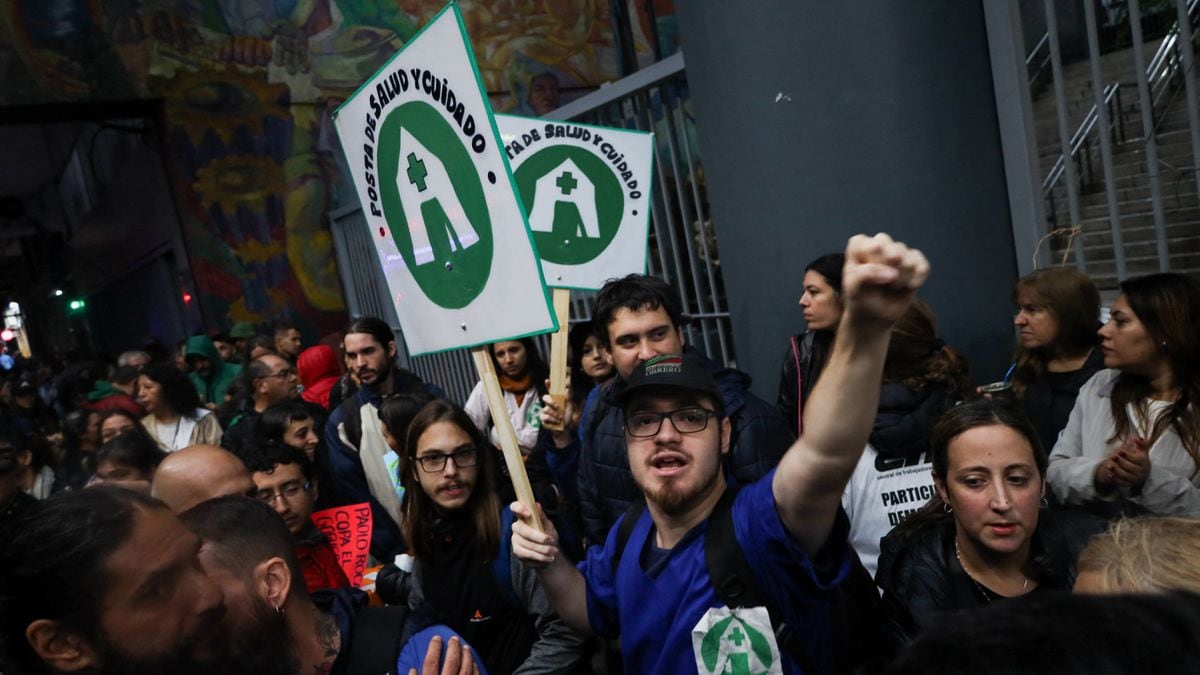The Argentine public sector is up in arms against Javier Milei for being the main victim of the ultraliberal president's chainsaw. Hundreds of people protested on Wednesday at the doors of ministries and state agencies over the recent dismissal of nearly 15,000 workers from the national public administration, whose contracts that expired on March 31 were not renewed by the Government. This Thursday will be the turn of public education: the teaching unions have called for a day of strike in protest against the elimination of the teacher incentive fund (Fonid) with which the national State financed part of the staff's salaries.
In the official headquarters, the atmosphere is increasingly tense. “Unity of the workers and those who don't like it get screwed, get screwed,” chanted the protesters who unsuccessfully tried to enter the Ministry of Labor on Wednesday. Federal police and security guards guarded all entrances and prevented those laid off from accessing the place where they worked until last week. Some 50,000 more employees are on the line: their contracts were renewed for three more months, but they are still under review: they do not know if after that time they will be the next to be left on the street.
The protests were called by the Association of State Workers (ATE), the main union of public employees in Argentina. In addition to the Ministry of Labor, there were rallies at the headquarters of the Foreign Ministry, the National Meteorological Service, the National Center for High Sports Performance (Cenard) and the National Institute against Discrimination, Xenophobia and Racism (Inadi). In the latter, closed by the Milei Government, the protesters managed to get through the door and moved the protest inside the building where this pioneering organization in Latin America in the fight against discrimination operated.
“Public offices are being filled with police,” the general secretary of ATE, Rodolfo Aguiar, denounced on social media. “There is no money (money) to buy food, there is no money to buy medicines, but there is money to repress,” he criticized. From the doors of the Ministry of Labor, Aguiar defended public employment and attacked the government discourse that identifies State workers with people who do not work, known in Argentina as “gnocchi.”
Members of the ATE during the protest this Wednesday in Buenos Aires. Cristina Sille (Reuters)
Although ATE estimated that the workers laid off in recent days are close to 11,000, presidential spokesman Manuel Adorni increased the figure to 15,000. Added to these recent dismissals is the dismissal of another 9,000 national public employees in the first three months of the Milei Government.
Adorni warned that retaliation will be taken against those protesters who commit acts “outside the law,” but Wednesday's protests ended without any arrests.
More private education
This Thursday, the focus of the protests shifts to public schools and universities. The Confederation of Education Workers of the Argentine Republic (CTERA) has called for a general strike among teaching workers throughout the country. The union demands that the Government replenish the Fonid, a fund that the national State sent to the provincial administrations to complement teacher salaries. Most provincial governments cannot cover these funds, which means a
de facto
cut in the income of teachers and professors.
The unions that defend public education workers also protest the budget adjustment applied by the Government: the funds for this year are the same as in 2023, but the 211% inflation recorded last year reduced their value to a third . Without a new injection of fresh funds, most public universities are not guaranteed to operate for the second half of the year.
The cut to state-run schools contrasts with the extraordinary aid that families who send their children to private centers will receive. The Government opened registration this week to offer “educational vouchers” for the equivalent of about $30 a month to help pay school fees. According to official calculations, nearly two million students could benefit from the measure.
Subscribe here to the EL PAÍS América newsletter and receive all the key information on current events in the region.

